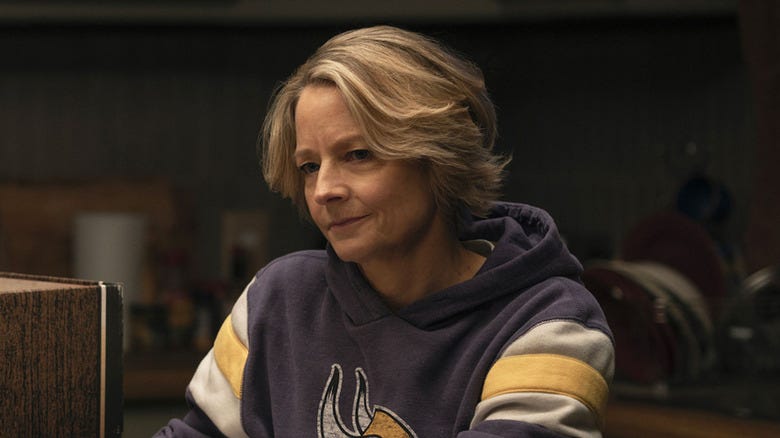Why is Jodie Foster Straight in "True Detective"?
The more we learn about Captain Liz Danvers, the stranger her straightness feels.
When Jodie Foster was announced as leading a reimagined True Detective, I was immediately in. It’s easy to get psyched for a new season of True Detective, but Foster helming the series felt cool, and new, and also totally true to the original. She’s a veteran actor, not an internet boyfriend, and feels right at home in a franchise known for dark, disturbing subject matter. She’s also, notably, a woman, and anybody familiar with the first season’s profound misogyny was thrilled to see a woman centered in a True Detective story. Also, it’s Jodie Foster!
Unfortunately, I just cannot buy that Jodie Foster’s character is sleeping with all these men.
It’s not because Foster herself is gay. And it’s not because her character, police chief Liz Danvers, feels extremely queer-coded in her own right. It’s also not because Danvers’ sexual attitudes — what sex means to her, what she derives from it — is presented as an important part of her character. It is all of those things, put together, in 2024, that make Danvers’ apparent straightness stick out as an incongruous creative choice that deeply undercuts the character’s believability.
First, let’s establish that Danvers was explicitly written as straight, Night Country’s creator and showrunner Issa López told Salon. In that interview, López said she wrote Danvers and her co-lead, Evangeline Navarro (Kali Reis), to “act in the ways that male characters traditionally have played forever” in their approach to sex. Night Country is set in the fictional town of Ennis, Alaska, and Ennis is peppered with men Danvers and Navarro have slept with, or are sleeping with; both women use sex to feel powerful and to push down difficult feelings. “As with the other True Detective [seasons], sex is part of the lives of these characters, and how they approach it says a lot about who they are,” López said.
But López also said that, while Navarro’s written as bisexual, “we only see them [Danvers and Navarro] having sex with men,” saying it’s “ironic” that Danvers “gets all this shit and all the jokes about her sexuality. Well, if she were a male character, no one would comment on the fact that she fucks around in town.” (For what it’s worth: Navarro’s character also feels deeply queer — she’s jacked outta her mind, speaks in a deep timbre and wears a sports bra during sex [if you know, you know]. It feels equally jarring to see her exclusively pursue and sleep with men — especially if sleeping with women would be true to her identity! Gah!)
It’s firmly within the True Detective tradition to weave gender politics through the story — the franchise’s famed first season adopted a grossly masculine perspective, rendering every female character either naked, dead, or shrill. The critic Emily Nussbaum said she was “initially charmed” by the show, but couldn’t ignore the narrative suggested by the show’s opening credits: a story of “heroic male outlines and closeups of female asses.”
It makes sense why López wants her female characters to exert power over, specifically, men. But it sounds like Navarro and Danvers were explicitly written to sleep with men … in order for Night Country to show women exerting power over men, rather than because that felt true to the characters. That logic also centers men in the experience of showing a woman’s power, suggesting that women are at the height of their powers when they’re exerting that power over men.
That’s one reason why Danvers’ straightness feels inauthentic. Another reason? Because, man, in a gut sense? It is a leap to believe that Foster’s swaggering, cocky police chief is even the least bit straight. Liz Danvers feels about as queer-coded as a lady in a bucket hat that reads “I ❤️ BOOBS, AND NOT IN A PLATONIC WAY.” She’s gruff, macho and matter-of-fact, sauntering into any room with her chest puffed out. In one scene, she’s wearing a Minnesota Vikings hoodie while complaining about fantasy football! Also, that queer-coded character is being portrayed by Jodie Foster, who’s openly gay, and the show is being released in 2024. Did you know that 128% of today’s film and television characters are gay? In fact, it feels like a bold choice to not write Danvers as gay! And it feels even bolder to show this otherwise butch character flirting with a guy she used to sleep with, and reference another dude she used to fuck, and show up on her (male) police captain’s doorstep in a black (!) lacy (!!) bra (!!!).
That’s also why Danvers’ sexuality matters so much: it’s an essential part of her character, present in a solid chunk of the show, and precisely how López intended to write her.
From López’s Salon interview:
“That was very important for me, since [the original] ‘True Detective’ did such a good job of exposing how . . . a certain type of man conceives the sexual exchange that happens and what impact it has around them, and what it says about the characters. I thought it was a perfect opportunity to talk about how women who are powerful, and who are making the decisions in their lives, approach sex. And it's in power. And it's for fun. And it's unashamed. It's just good, fun sex.”
López is dead on! We saw plenty of sex in True Detective’s first season, and seeing each character’s relationship to sex only helped to deepen our understanding of them. So, why on Earth should Danvers be chaste? Why shouldn’t she get that additional layer of development? But it’s precisely that excellent decision to give Danvers a rich sex life that makes her prescribed straightness feel like a profound contradiction. If Danvers got the usual female treatment and wasn’t given a rich sex life, her apparent straightness may feel surprising, sure, but not stick out so much that it’s impossible to ignore. But that’s not how she’s written. And in a sad twist, this doesn’t just make it difficult to care about Danvers — it puts a ceiling on how emotionally invested I’ll ever be able to get in Night Country as a whole.
Hi! Obviously, these Night Country recaps aren’t coming on Mondays, and they aren’t really recaps anymore. So! Instead, you can expect an essay or reflection on each week’s episode the following week, whenever I’m done writing it. Muah!





OBSESSED - so true!!!!!! #makethemgay